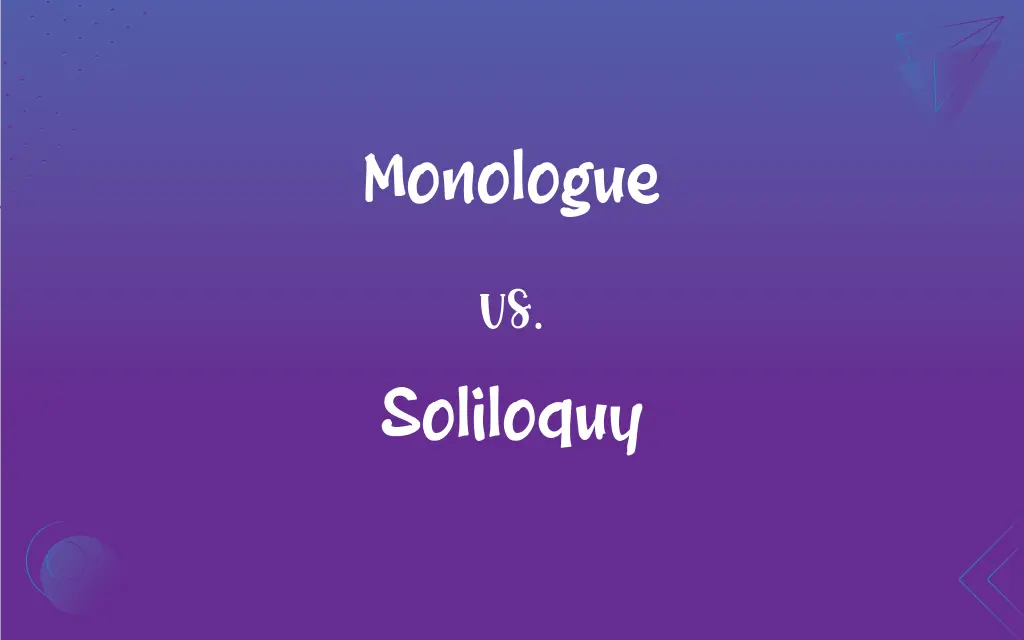Monologue vs. Soliloquy: What's the Difference?
Edited by Aimie Carlson || By Harlon Moss || Updated on October 16, 2023
A monologue is a long speech by one person in a conversation or performance, while a soliloquy is a character's spoken thoughts, alone on stage.

Key Differences
A monologue is a speech presented by a single character, most often to express their mental thoughts aloud. On the other hand, a soliloquy does not represent spoken dialogue, but rather a character's internal thoughts and feelings. The monologue can be directed towards other characters in the play, while a soliloquy is always a character talking to themselves, sharing their innermost thoughts with the audience.
Monologues are an integral part of both drama and prose fiction, where a character delivers a set speech to other characters who are on stage. Soliloquies, however, are typically found in drama, particularly in the works of Shakespeare, where characters articulate their innermost thoughts to the audience, unheard by the other characters.
Monologues serve various purposes, such as providing the audience with background information, revealing a character's thoughts, or serving as a dramatic highlight. Soliloquies, however, are used to reveal a character's most intimate thoughts and feelings, often serving to divulge secrets or intentions that are hidden from other characters.
Monologues can be found in a wide range of theatrical styles, from Greek tragedies to modern dramas. Soliloquies, while still used today, are more characteristic of classical drama, especially that of Elizabethan theatre, and are less common in contemporary plays.
Both monologues and soliloquies are dramatic devices that allow characters to express themselves directly to the audience. However, while monologues may address others on stage or the audience explicitly, soliloquies are always the character's inner thoughts, not spoken to other characters, even if they're physically present.
ADVERTISEMENT
Comparison Chart
Definition
Speech to other characters
Speech revealing inner thoughts
Audience
Characters or viewers
Solely the viewers
Presence of Others
Possible
Absent
Interaction
Potential
None
Dramatic Function
Convey information, persuade
Reveal secrets, inner conflict
ADVERTISEMENT
Monologue and Soliloquy Definitions
Monologue
A dramatic scene where one actor speaks for an extended period.
Her powerful monologue in the final scene earned a standing ovation.
Soliloquy
A form of monologue where a character speaks to the audience, unheard by other characters.
In a poignant soliloquy, he shared his plan for revenge with the audience.
Monologue
A comedic routine delivered by a stand-up comedian.
His opening monologue had the audience roaring with laughter.
Soliloquy
A dramatic device used to convey a character's innermost thoughts.
Her soliloquy revealed her turmoil and indecision, captivating the audience.
Monologue
A lengthy speech in a conversation, often monopolizing the conversation.
During dinner, he gave a monologue about his adventures abroad, and we couldn't get a word in.
Soliloquy
A speech in which a character talks to themselves, revealing thoughts.
Hamlet's 'To be or not to be' soliloquy is Shakespeare's most famous.
Monologue
A form of performance where a solo speaker tells a story.
The festival featured a monologue competition, and the stories ranged from hilarious to heart-wrenching.
Soliloquy
A literary device that reveals a character's internal conflict.
The play's intense climax was her soliloquy about choosing between loyalty and love.
Monologue
A literary device used for expressing a character's inner thoughts.
The villain's monologue revealed his motives but gave the hero time to escape.
Soliloquy
An act of speaking one's thoughts aloud when alone or regardless of any hearers.
Lost in thought, she delivered a soliloquy on the futility of her quest.
Monologue
A lengthy, uninterrupted speech by a single character, as in a play or novel.
Soliloquy
A monologue, especially in a play, that is delivered by a character who is alone or unaware of the presence of other characters and that reveals the thoughts or feelings of that character.
Monologue
A literary composition in monologue form.
Soliloquy
The act of speaking to oneself.
FAQs
What is a soliloquy?
A soliloquy is a type of monologue where a character speaks their inner thoughts aloud, typically alone on stage.
Are characters present during a soliloquy?
No, typically during a soliloquy, the character is alone, speaking their thoughts to the audience.
Are other characters present during a monologue?
Yes, during a monologue, other characters are often on stage or part of the conversation.
Can a monologue be directed at the audience?
Yes, a monologue can be directed at the audience, known as a direct address.
Are monologues used in comedy?
Yes, monologues are common in stand-up comedy and comedic plays or films.
Are monologues only in plays?
No, monologues can be in plays, movies, prose, or performed as stand-alone pieces.
What's the purpose of a soliloquy?
Soliloquies reveal a character's innermost thoughts, feelings, and plans to the audience.
Do soliloquies break the fourth wall?
While the character doesn't directly acknowledge the audience, soliloquies do share internal thoughts with them.
Are soliloquies outdated in modern theater?
Not completely, but soliloquies are more characteristic of classical drama.
Can a monologue be silent?
No, a monologue involves speaking, but the character might be silent during a dramatic pause.
Is a soliloquy spoken dialogue?
A soliloquy is spoken aloud but represents the character's internal thoughts, not dialogue with others.
Are all lengthy speeches monologues?
No, monologues are structured and intentional speeches, not just any lengthy speech.
Are soliloquies always serious?
Often, but not always. Soliloquies can also contain humor, irony, or sarcasm, depending on the character's personality.
What's a monologue?
A monologue is an extended speech by one person to others in a play, conversation, or performance.
What's the purpose of a monologue?
Monologues can reveal character, advance the plot, or express opinions and emotions.
Do monologues reveal personal secrets?
Monologues can reveal secrets, especially if the character trusts the listeners or wants to manipulate them.
Do soliloquies reveal secrets?
Often, yes. Soliloquies are a way for characters to confide their hidden thoughts or plans to the audience.
Who hears a soliloquy?
Only the audience hears a soliloquy; it's the character's internal dialogue spoken aloud.
How long is a typical monologue?
Monologues vary in length but are often several minutes long to maintain audience interest.
How long is a typical soliloquy?
Soliloquies can range from brief speeches to several minutes, revealing significant character thoughts.
About Author
Written by
Harlon MossHarlon is a seasoned quality moderator and accomplished content writer for Difference Wiki. An alumnus of the prestigious University of California, he earned his degree in Computer Science. Leveraging his academic background, Harlon brings a meticulous and informed perspective to his work, ensuring content accuracy and excellence.
Edited by
Aimie CarlsonAimie Carlson, holding a master's degree in English literature, is a fervent English language enthusiast. She lends her writing talents to Difference Wiki, a prominent website that specializes in comparisons, offering readers insightful analyses that both captivate and inform.
































































